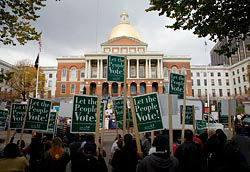Court says legislators have a constitutional duty to vote on same-sex marriage amendment
BOSTON (CNS) -- The Supreme Judicial Court of Massachusetts said Dec. 27 that it could not force the state's legislators to vote on a proposed constitutional amendment banning same-sex marriage, but they should take the vote.
The court said it could only seek to persuade legislators to act in good faith, since "there is no presently articulated judicial remedy for the Legislature's indifference to, or defiance of, its constitutional duties."
Less than a week earlier the bishops who head the state's four Roman Catholic dioceses wrote to all legislators urging them to move the proposed amendment forward Jan. 2 so that the people will be able to vote on it by popular referendum, as provided by the state constitution.
"Efforts to evade a vote will prolong a contentious constitutional debate," the bishops said.
As a result of a 2003 Supreme Judicial Court decision, in 2004 Massachusetts became the only U.S. state to legalize same-sex marriages. About 8,000 such marriages have been performed since then.
In late 2005 the proposed Massachusetts Protection of Marriage Amendment, which would restore the traditional definition of marriage as the union only between a man and a woman, was introduced as a popular initiative that garnered about 170,000 signatures -- more than double the number needed. It was submitted to legislators the following January.
Even if the Legislature approves the proposal now, it would still have to be approved again by the 2007-08 session of the Legislature and would not come to a popular vote until November 2008.
Under Massachusetts law any amendment to the state constitution must be approved in two consecutive legislative sessions before it can go on the ballot for a general referendum.
"Preventing a vote on Jan. 2 would deny a significant number of our residents from having their voice heard on this issue," the bishops wrote in a Dec. 21 letter to the legislators. "The guarantee that gives citizens the right to seek voter approval for constitutional changes would become an empty promise."
Jan. 2 is the last day of the 2005-06 session of the Legislature.
Constitutional amendments are considered only when the Massachusetts House and Senate meet jointly for a constitutional convention.
Before the court's decision, there was wide speculation that a constitutional convention would be cut short again, as it was in 2002, to avoid a vote and effectively kill the initiative.
Even though the high court said it did not have the authority to force a vote, it said in its ruling that the drafters of the constitution's citizen petition provision "did not intend a simple majority of the joint session to have the power effectively to block progress of an initiative."
It said legislators who vote to recess without considering the initiative "seek to avoid their lawful obligations" and "ultimately will have to answer to the people who elected them."
"The members of the joint session have a constitutional duty to vote, by the yeas and nays, on the merits of all pending initiative amendments before recessing on Jan. 2, 2007," the court said.
In their letter the state's residential bishops urged legislators not to avoid the issue by "procedural maneuvers."
"Please give serious consideration to the fact that redefining marriage weakens an institution whose health is critical to the common good," they wrote. "By inventing new entitlements that trample the institution of marriage, four unelected judges have done a great disservice to the citizens." The 2003 Supreme Judicial Court's decision declaring that same-sex couples cannot be denied a right to marry was approved on a 4-3 vote.
The bishops noted that about 3 million of the 6.4 million residents of Massachusetts are members of parishes in their dioceses.
Signing the letter were Cardinal Sean P. O'Malley of Boston and Bishops George W. Coleman of Fall River, Timothy A. McDonnell of Springfield and Robert J. McManus of Worcester.



















